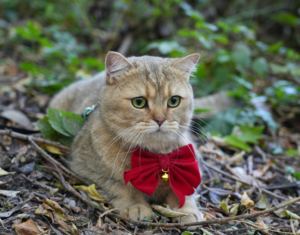Whoever came up with the phrase “curiosity killed the cat” was definitely on to something. If you’ve ever owned one, you’d know they have a knack for squeezing into tight spaces (looking for things that aren’t missing), swiping things off counters, and nibbling on anything and everything they absolutely should not be nibbling on. While their curiosity is adorable, it can also be dangerous, sometimes even deadly.
Índice
As responsible pet parents, it’s crucial to cat-proof your home and keep certain everyday household items out of reach. Some of the most unexpected things can pose serious health risks to your feline friend. So, before your cat turns your house into their personal playground, here are 10 things you should never, ever ever leave around your cat.
1. Lilies – Pretty but Deadly
If you have flowers in your home, double-check that they aren’t lilies. While they may be beautiful, lilies are highly toxic to cats. Even a small amount, like licking pollen off their fur, nibbling a leaf, or drinking water from a vase—can lead to kidney failure and death.
Symptoms of lily poisoning in cats:
- Vómitos
- Letargo
- Pérdida de apetito
- Increased thirst and urination (early stage)
- Sudden kidney failure (later stage)
What to do:
If you suspect your cat has even touched a lily, seek emergency veterinary care immediately. Time is crucial and even delayed treatment can be fatal.
Alternatives: If you love having flowers in your home, opt for cat-safe options like roses, sunflowers, or orchids.
Learn more: ASPCA Toxic Plant List
2. Candles & Essential Oils – Not as Innocent as They Seem
Who doesn’t love a cozy, fragrant home? Unfortunately, candles and essential oils can be harmful to cats.
- Scented candles release toxic fumes that can irritate a cat’s sensitive respiratory system.
- Many essential oils (especially tea tree, eucalyptus, citrus, and peppermint) are toxic when inhaled or ingested.
Symptoms of essential oil poisoning in cats:
- Babeando
- Difficulty breathing
- Letargo
- Vómitos
- Temblores
What to do:
If your cat is exposed to essential oils, remove them from the area and contact a vet immediately. Never use essential oils directly on your cat! In cases of emergency, contact: Pet Poison Helpline – Essential Oils
Alternatives: Use pet-safe diffusers with cat-friendly essential oils like frankincense or lavender (in small amounts). However, if you can, just steer clear if you have a very sensitive cat.
3. Recliners – A Hidden Danger
It might sound surprising, but recliners and sofa chairs can pose a major risk for cats, especially kittens. Cats love squeezing into small spaces, and the inside of a recliner is an inviting hiding spot. But when someone reclines or closes the chair, a cat trapped inside can be crushed or seriously injured.
What to do:
- Always check under the recliner before sitting down.
- Block off access to reclining furniture when you’re not around.
4. Onions & Garlic – A Cat’s Worst Kitchen Nightmare
Photo by Pixaby
Onions, garlic, and anything in the allium family (chives, leeks, shallots) are highly toxic to cats. Even a small amount can damage red blood cells, leading to anemia and organ failure.
Common sources of onion/garlic poisoning in cats:
- Table scraps
- Baby food
- Pre-packaged meals
- Onion/garlic powder in snacks
What to do:
If your cat ingests even a small amount, contact a vet immediately. Síntomas may not appear for several days, so don’t wait.
Safer alternatives? Cats don’t need seasonings! Stick to plain, cooked meats.
5. Grapes & Raisins – Small But Deadly
Photo by Bruno Scramgnon
Many pet owners don’t realize that grapes and raisins are extremely toxic to cats. These little snacks can cause sudden kidney failure, even in small amounts.
Signs of grape/raisin poisoning in cats:
- Vómitos
- Diarrea
- Pérdida de apetito
- Letargo
What to do:
If you suspect your cat has eaten grapes or raisins, get to a vet ASAP. There’s no antidote, and the faster your cat receives treatment, the better the outcome.
Safe alternatives? Stick to cat-friendly treats like freeze-dried meats or small bites of cantaloupe.
6. Rogaine (Minoxidil) – Toxic Even in Small Doses
Minoxidil (found in Rogaine and other hair regrowth products) is highly toxic to cats. Even small exposures, like rubbing against someone’s treated scalp or licking residue off hands, can be deadly.
Symptoms of Minoxidil poisoning in cats:
- Letargo
- Difficulty breathing
- Fluid buildup in the lungs
- Sudden collapse
What to do? Keep all hair growth products far away from your cat. If exposed, seek emergency vet care immediately.
More info: FDA Pet Safety Warnings
7. Electrical Cords – A Chew Toy Nightmare

Many cats, especially kittens, love chewing on cords, but this can electrocute them or cause severe mouth burns.
How to prevent electrical injuries:
- Use cord protectors or cover wires with PVC tubing.
- Keep chargers and power strips out of reach.
- Provide safe chew toys to redirect their attention.
8. Salt – Too Much Can Be Fatal
Too much salt can cause salt poisoning (hypernatremia) in cats. Common sources include:
- Salty snacks (chips, pretzels)
- Play-Doh (yes, it contains high amounts of salt!)
- Salt lamps (licking them repeatedly can be dangerous)
Symptoms of salt poisoning in cats:
- Vómitos
- Temblores
- Seizures
- Coma
9. String, Thread & Hair Ties – A Hidden Danger
String might seem like a fun toy, but swallowing it can cause a deadly intestinal blockage.
What to do?
- Never leave string, floss, yarn, or ribbon unattended.
- Opt for safer alternatives like cat-safe wand toys.
10. NSAIDs – Deadly Pain Relievers
Ibuprofen (Advil), naproxen (Aleve), and aspirin are toxic to cats even in tiny amounts.
Symptoms of NSAID poisoning in cats:
- Stomach ulcers
- Insuficiencia renal
- Seizures
Only give pain relief under veterinary guidance, and please, for heaven’s sake, don’t leave yours just lying around.
Principales conclusiones
- Cats are naturally curious, but some household items can be deadly.
- Lilies, grapes, onions, and certain medications are extremely toxic.
- Always store dangerous items out of reach and provide safe alternatives.
- Your cat depends on you to keep them safe. Make your home a danger-free zone!





